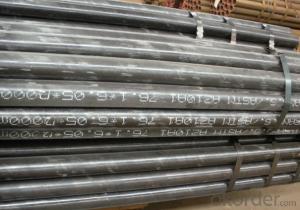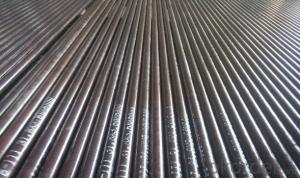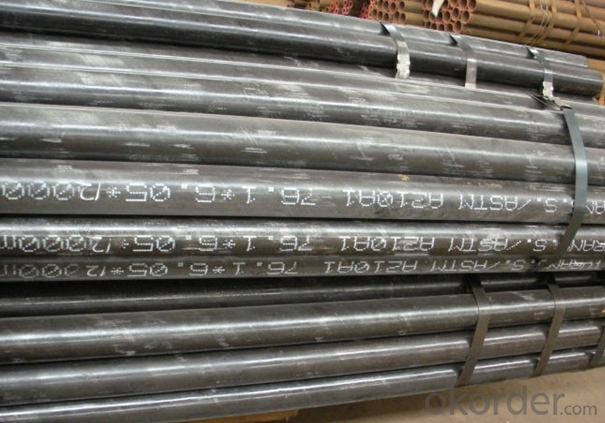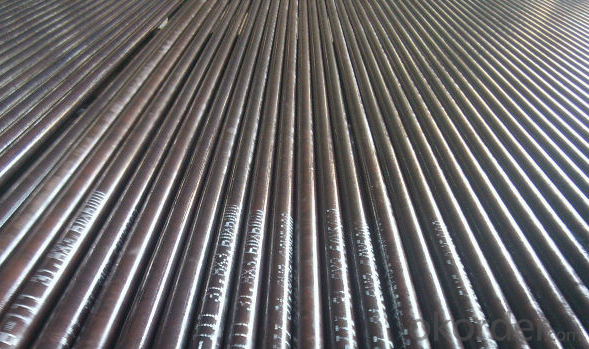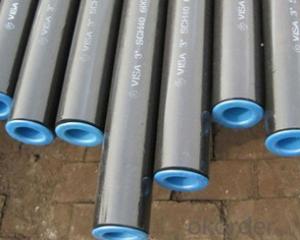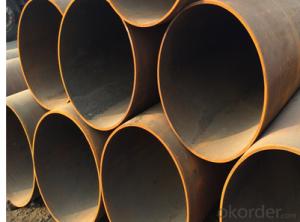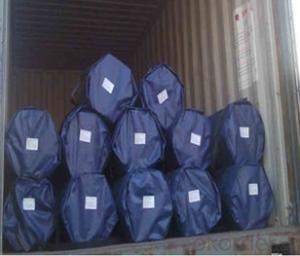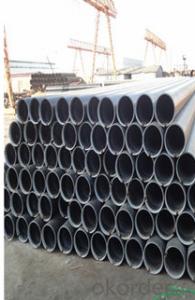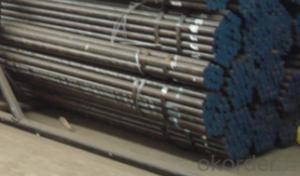Carbon steel seamless pipe for boiler 12Cr1MoV CNBM
- Loading Port:
- Qingdao
- Payment Terms:
- TT OR LC
- Min Order Qty:
- 10 pc
- Supply Capability:
- 30 pc/month
OKorder Service Pledge
OKorder Financial Service
You Might Also Like
Quick Details
| Thickness: | 1.2 - 20 mm | Section Shape: | Round | Outer Diameter: | 12.7 - 168 mm |
| Place of Origin: | Jiangsu China (Mainland) | Secondary Or Not: | Non-secondary | Application: | Boiler Pipe |
| Technique: | Cold Drawn | Certification: | PED | Surface Treatment: | oil coating |
| Special Pipe: | Thick Wall Pipe | Alloy Or Not: | Is Alloy | ASTM A213: | T2,T5,T9,T11,T12,T22,T23,T91,T91 |
| ASTM A335: | P1,P2,P5,P9,P11,P12,P22,P23,P91,P92 | DIN17175: | 15Mo3,10CrMo910,12CrMo195,13CrMo44 | Grade: | 12Cr1MoV,Cr5Mo,Cr9Mo,12Cr1MoVG,Cr5MoG,A335 P11,A335 P5,A335 P9,A335 P1,A213,A192,A210,A335 P12,A335 P23,St35.8,Cr-Mo alloy,A53-A369,ST35-ST52 |
| Standard: | BS 3059-2,DIN EN 10216-1-2004,DIN 17175,ASTM A213-2001,ANSI A210-1996,ASTM A179-1990,BS,DIN,ASTM |
Packaging & Delivery
| Packaging Detail: | Seaworthy export packing |
| Delivery Detail: | 45 Days |
Specifications
Standard: ASTM A179,ASTM A192,ASTM A210,DIN17175,EN10216-1
Material:P235GH,ST35.8,ST45.8
Manufacture method:cold drawn
Product Description
Commodity: Carbon steel seamless pipe for boiler
Standard&material: ASTM A179,ASTM A192,ASTM A210 Gr.A1,Gr.C,DIN17175 ST35.8,ST45.8,EN10216-1 P235GH,P265GH,etc.
Size range: 12mm*1.2mm - 168mm*20mm
Manufacture method: cold rolled, cold drawn
Delivery condition: Normalized, Normalized and Tempered.
Mill test certificate as per EN10204 3.1B is available.
Third party inspection is acceptable.
Tubes will be ECT+UT.
- Q: Can steel pipes be used for stadium construction?
- Yes, steel pipes can be used for stadium construction. Steel pipes are commonly used in stadium construction due to their strength, durability, and ability to withstand heavy loads. They can be utilized for various purposes such as supporting the stadium structure, creating frames for roof structures, and facilitating the installation of plumbing and electrical systems. Additionally, steel pipes can be easily fabricated, allowing for efficient construction and customization according to the specific requirements of the stadium design.
- Q: What is the difference between steel pipe and fiberglass pipe?
- Steel pipe and fiberglass pipe differ in terms of their material composition, flexibility, resistance to corrosion, and cost. Steel pipe is made of an alloy of iron and carbon, known for its strength and durability, making it a popular choice for plumbing, construction, and industrial projects. In contrast, fiberglass pipe is composed of glass fibers embedded in a resin matrix, resulting in a lightweight and corrosion-resistant material suitable for applications requiring chemical resistance. Another contrasting factor between steel pipe and fiberglass pipe is their level of flexibility. Steel pipe is rigid and stiff, while fiberglass pipe offers greater flexibility, allowing it to bend and conform to different shapes and contours. This flexibility makes fiberglass pipe easier to install in tight spaces or areas with complex geometries. Corrosion resistance is another significant difference between the two materials. Steel pipe is susceptible to corrosion, particularly in environments with high moisture or chemical exposure. To counteract this, steel pipes are often coated or lined with corrosion-resistant materials. In contrast, fiberglass pipe is inherently resistant to corrosion due to its construction, making it a preferred choice for applications in saltwater environments or chemical processing plants. Cost is yet another factor that sets steel pipe and fiberglass pipe apart. Generally, steel pipe is more affordable than fiberglass pipe, especially for smaller diameter pipes. However, as the diameter and pressure rating increase, the cost of steel pipe can exceed that of fiberglass pipe. Additionally, fiberglass pipe requires less maintenance and has a longer lifespan, which can offset the initial cost difference over time. In conclusion, the differences between steel pipe and fiberglass pipe can be summarized in terms of their material composition, flexibility, corrosion resistance, and cost. The choice between these two types of pipes depends on various project requirements, including the application, environment, budget, and expected lifespan.
- Q: How are steel pipes used in the manufacturing of HVAC systems?
- Steel pipes are commonly used in the manufacturing of HVAC systems for various purposes. They are used to transport fluids, such as water or refrigerants, throughout the system. Steel pipes are also used for exhaust systems and ventilation, providing a durable and corrosion-resistant solution. Additionally, steel pipes are used in the construction of HVAC equipment, such as heat exchangers and boilers, due to their strength and ability to withstand high temperatures and pressures. Overall, steel pipes play a crucial role in the efficient and reliable functioning of HVAC systems.
- Q: What are the factors to consider when designing a steel pipe system?
- When designing a steel pipe system, several factors need to be considered to ensure its functionality, durability, and efficiency. These factors include: 1. Pressure and temperature requirements: Determining the maximum pressure and temperature that the steel pipe system will be exposed to is crucial. This information is essential for selecting the appropriate pipe material, thickness, and jointing method to withstand the system's operating conditions. 2. Pipe material: Choosing the right material for the steel pipe system is important. Factors such as corrosion resistance, strength, and cost should be considered. Common materials for steel pipes include carbon steel, stainless steel, and alloy steel. 3. Pipe size and thickness: Calculating the adequate pipe size and wall thickness is essential to ensure the required flow rate and pressure drop within the system. The pipe size affects the system's efficiency and must be chosen based on the anticipated flow rates and pressure losses. 4. Support and anchoring: Proper support and anchoring are critical to prevent sagging, movement, and stress on the steel pipe system. The design should consider the weight of the pipes, the fluid being transported, and any external forces that may act on the system. 5. Expansion and contraction: Steel pipes expand and contract with temperature variations, causing stress on the system. Expansion joints or loops should be incorporated to allow for thermal growth and contraction, preventing damage and distortion. 6. Fluid compatibility: Understanding the properties of the fluid being transported, such as corrosiveness, viscosity, and potential for sedimentation or scaling, is important in selecting the appropriate pipe material and protective coatings or linings. 7. Accessibility and maintenance: Consideration should be given to the accessibility of the system for installation, inspection, and maintenance purposes. Proper access points, valves, and fittings should be included in the design to allow for easy maintenance and repairs. 8. Environmental factors: The steel pipe system may be exposed to various environmental conditions, such as extreme temperatures, humidity, or corrosive substances. These factors should be considered when selecting the pipe material, protective coatings, and insulation. 9. Regulatory compliance: Compliance with applicable industry standards, codes, and regulations is essential. The design should adhere to safety guidelines and applicable building codes to ensure the pipe system's integrity and longevity. 10. Cost consideration: Finally, the overall cost of the steel pipe system, including material, installation, maintenance, and energy consumption, should be taken into account. Balancing cost-effectiveness with performance requirements is crucial in achieving an efficient and economical design. By considering these factors, engineers and designers can create a steel pipe system that is suitable for its intended purpose, ensuring its longevity, reliability, and safety.
- Q: What is the role of steel pipes in the transportation of liquefied natural gas (LNG)?
- Steel pipes play a vital role in the transportation of liquefied natural gas (LNG) due to their unique properties and characteristics. LNG is a form of natural gas that has been cooled to a liquid state for ease of transportation and storage. The transportation of LNG requires specific infrastructure, and steel pipes are an essential component of this infrastructure. Firstly, steel pipes are used in the construction of LNG terminals and liquefaction plants. These facilities are responsible for converting natural gas into its liquid form and storing it before transportation. The extreme cold temperatures required to maintain LNG in its liquid state necessitate the use of materials that can withstand these conditions, and steel pipes are well-suited for this purpose. Steel pipes have excellent strength and durability, making them capable of handling the low temperatures and high pressures involved in the liquefaction and storage processes. Secondly, steel pipes are used in the transportation of LNG from the liquefaction plants to the storage tanks or shipping vessels. LNG is typically transported over long distances, either through pipelines or via specialized LNG carriers. Steel pipes are used in the construction of underground or above-ground pipelines, providing a reliable and safe means of transporting the LNG. The pipes must be able to maintain the low temperatures of the LNG while withstanding the pressures and stresses associated with the transportation process. Steel pipes offer the necessary strength, corrosion resistance, and thermal properties to ensure the safe and efficient transportation of LNG. Lastly, steel pipes are also used in the construction of storage tanks for LNG. These tanks are designed to maintain the LNG in its liquid state until it is ready for use or further transportation. The tanks are often constructed using a combination of steel plates and steel pipes. Steel pipes are used to connect the various components of the tank, such as the inner and outer shells, reinforcing the structural integrity of the tank and ensuring its ability to withstand the extreme conditions to which it is subjected. In summary, steel pipes play a crucial role in the transportation of liquefied natural gas (LNG) due to their strength, durability, and ability to withstand low temperatures and high pressures. From the construction of LNG terminals and liquefaction plants to the transportation through pipelines or on specialized vessels, steel pipes are a vital component of the infrastructure required for the safe and efficient transportation and storage of LNG.
- Q: What are the different types of coatings used for steel pipes?
- There are several types of coatings commonly used for steel pipes, including epoxy coatings, polyethylene coatings, zinc coatings, and coal tar coatings. Each type of coating offers unique benefits and is used for specific applications to protect the steel pipes from corrosion and other forms of damage.
- Q: Can steel pipes be used for conveying natural gas?
- Certainly, natural gas can indeed be transported through steel pipes. In reality, steel pipes are frequently employed for this task owing to their robustness, long-lasting nature, and capacity to endure elevated pressures. Moreover, steel pipes exhibit exceptional resistance to corrosion, a vital feature when conveying natural gas containing impurities such as water and sulfur compounds. Furthermore, connecting various parts of the pipeline becomes effortless with steel pipes, thanks to their ease of welding. All in all, when it comes to conveying natural gas, steel pipes emerge as a trustworthy and secure option.
- Q: What are the common defects found in steel pipes?
- Some common defects found in steel pipes include corrosion, cracks, pitting, scaling, and distortion.
- Q: What are the advantages of using steel pipes in the manufacturing industry?
- Steel pipes offer several advantages in the manufacturing industry. Firstly, steel pipes are highly durable and have a long lifespan, making them ideal for handling heavy loads and withstanding harsh conditions. Secondly, steel pipes are resistant to corrosion, rust, and chemical reactions, ensuring that the material being transported or processed remains uncontaminated. Additionally, steel pipes have high tensile strength and can withstand high pressure, making them suitable for various applications like transporting liquids, gases, and solids. Furthermore, steel pipes are versatile and can be easily customized to meet specific manufacturing requirements. Lastly, steel pipes are cost-effective due to their longevity, low maintenance needs, and recyclability, making them an economical choice for the manufacturing industry.
- Q: What are the typical lengths of steel pipes?
- The typical lengths of steel pipes vary depending on their intended use and application. However, common lengths for steel pipes range from 18 to 24 feet (5.5 to 7.3 meters).
Send your message to us
Carbon steel seamless pipe for boiler 12Cr1MoV CNBM
- Loading Port:
- Qingdao
- Payment Terms:
- TT OR LC
- Min Order Qty:
- 10 pc
- Supply Capability:
- 30 pc/month
OKorder Service Pledge
OKorder Financial Service
Similar products
Hot products
Hot Searches
Related keywords
